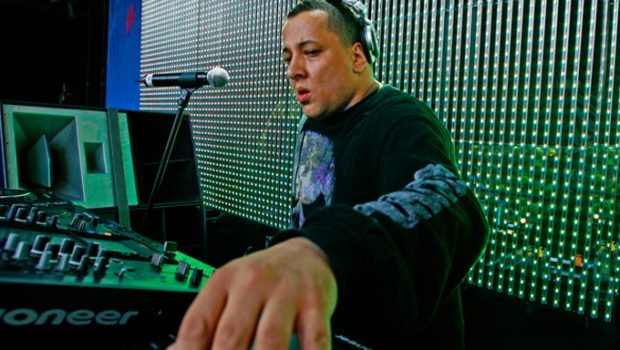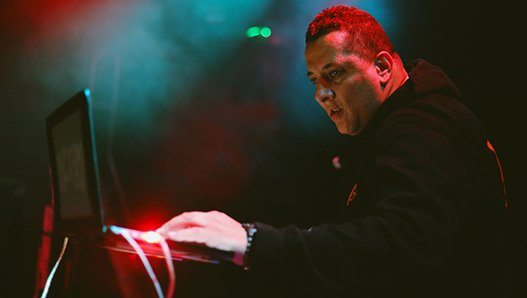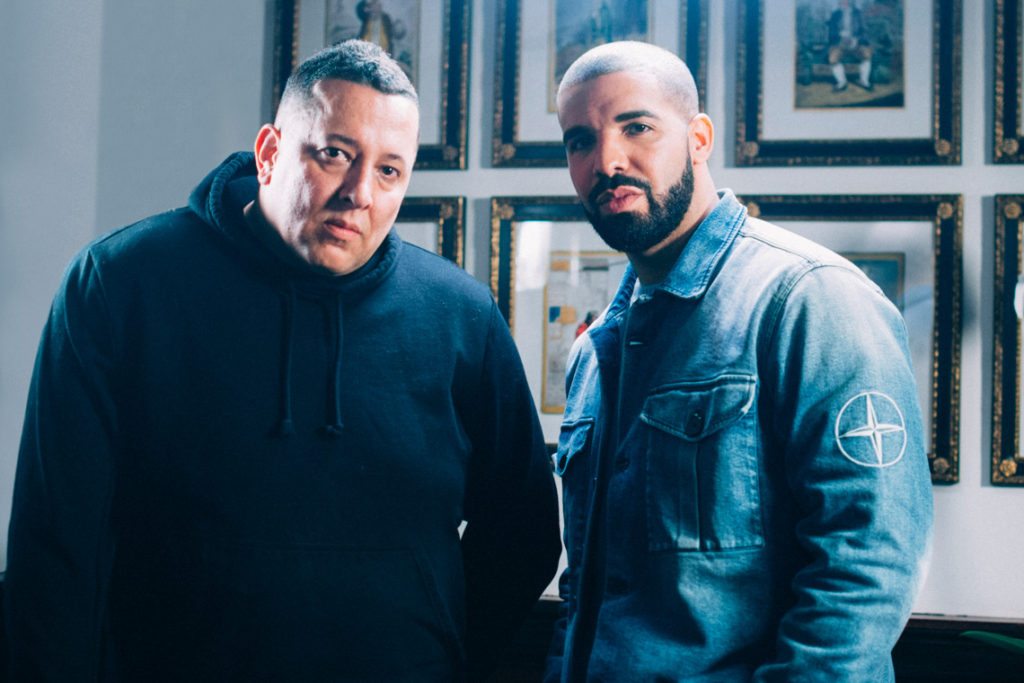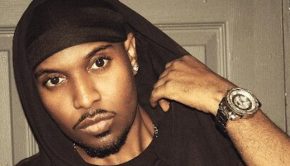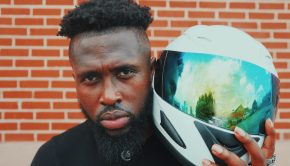DJ Semtex talks the release of his book ‘Hip Hop Raised Me’
DJ Semtex Release of His New Book Hip Hop Raised Me
Interview by Maya Baroody
The World renowned disk jockey and BBC 1Xtra Radio Host DJ Semtex talks about the creation of his new book Hip Hop Raised Me, his view on news and popular media, what it means to be an underdog, and spills gems of knowledge that every hip hop fanatic or musician can benefit from.
M: So, it appears you have created 2016’s Encyclopedia of Hip Hop. When did you get the idea for this book and how long have you been working on it?
SEMTEX: Well, this book’s a lifetime in the making. I grew up on hip-hop; it educated me, changed my outlook on life. It raised me in terms of discovering the world that wasn’t taught in school so, listening to artists like The Jungle Brothers, Public Enemy, people like them, BDP, it opened my eyes, opened my mind to what was going on. So the book’s been in the making since then basically because it’s everything that I’ve experienced or witnessed or celebrated.
M: It’s my understanding that it only took you six months to finish?
SEMTEX: Yeah, I’ve been DJ’ing for BBC Radio 1Xtra, my Friday night radio show for the last 15 years, I’ve done over 600 interviews. I’ve had the fortunate experience of being able to work with some of the greatest artists, without that opportunity, or without touring the world or DJ’ing with individual artists whether it was Rick Ross, Nas, Riff Raff or whoever, from every diverse aspect of the spectrum of hip-hop, I couldn’t have written this book. There’s no way I could’ve done it without experiencing that and working directly with the artists.
M: Are there any books you feel changed your life?
SEMTEX: Good question…I think a book that changed my life was The Autobiography of Malcolm X. I read that because of listening to Public Enemy, listening to all these rappers talk about figures like Martin Luther King, Marcus Garvey, Malcolm X. I think reading about Malcolm X and his life experiences that I could relate to–he went from being in the wilderness of ignorance, but he got educated, he got enlightened when he joined the Nation of Islam, but he when he went to Mecca he understood that it wasn’t just about black people or white people. And that’s why he left the Nation because he began to take on things from a humanitarian aspect. It was just fascinating to read about a guy who came from nothing, turned his life around, questioned what he initially felt was right or had been educated on, and ultimately opened up and accepted a different way of thinking. I just find the whole thing fascinating and think even for me it changed my life, you know, it was more the humanitarian aspect, the fact that, we should all be working together, regardless of color or religion, how you look, race or gender. For me that was fascinating at the time, I’d never been exposed to that kind of history. It’s the kind of thing that should be taught in schools. I hate Black History Month because all history is important, and to put a limit on something for one month, it should be all year round for everybody, in the same way, everybody should learn about all religions, everyone should learn about everyone’s history—that’s the only way we’re ever gonna make it as the human race.
M: Tell me a little bit about how you went from your first Public Enemy concert to having Chuck D write you this meaningful forward to Hip Hop Raised Me.
SEMTEX: It’s um, haha, it’s an epic saga. To put it into a shorter context, basically, I’m a fan, you know, passionate about the culture, excited about music, I get excited about certain albums, I love lyricism, I delved into the street art aspects of it. Then I was DJ’ing, and DJ’ing is what’s taken me everywhere, DJ’ing is like, from doing radio interviews to doing clubs to doing shows, it’s almost like I’m the silver surfer of Hip-Hop—I’ve been able to go into different areas and experience different things, and I’ve always been a fan of Public Enemy, I still listen to It Takes a Nation of Millions [to Hold Us Back] and Fear of a Black Planet regularly, and when I got this opportunity to write the book I thought, who else could I approach to do the forward, who is the most significant person that could write a forward? It’s gotta be Chuck D from Public Enemy because you know, it’s his fault I’m like this, haha, and he’s got that international overview. They always had the overseas thing before anybody else, they’ve done hundreds of worldwide tours, more than most hip hop artists will ever do, and he understood the UK scene and the importance of it very early on, he’s always worked with artists from the UK. He gave me the time to do an interview several times, and he didn’t need to do that, because, they’re at a point where they don’t really need to do interviews anymore, but, he understood the merit of what we represent in the UK and what the fans represent, what the hip hop represents and yeah, I just reached out to him. I emailed him, and I gave him a very very honest, emotional email saying that I need you to do this like, you’re the only person who could do it. He responded straight away and was like ‘I got you’ and then he did it. And in the forward, he refers to me as a generator of generations, and he talked about, you know, the need for people to support new artists in the same way we support the mature artists. I never even looked at it like that, but even the fact that he put it into those words, I feel a great deal of responsibility now moving forward in terms of documenting the culture in the right way, supporting the culture in the right way because, it’s all about celebrating the richness and the wealth of the culture, you know, and I don’t think the balance of the positive aspects is always equal, a lot of the negative stuff gets celebrated, and I’m not about that at all, I’m like just, follow the positive.
M: Do you have a particular platform that you like to receive news or political information from? If it were up to you, how would people stay “woke”?
SEMTEX: Right now the best way to consume information and stay woke for me, and quickly as well, is the Al Jazeera + Twitter timeline. It’s amazing because, we’re all busy, we’ve all got things to do and read, and they compress stories into short video clips that get straight to the point, just the facts. For me that’s the best source of information because there’s a lot of misinformation going around right now, this whole thing about fake news, its not fake news, it’s called propaganda, right? But it’s serious, and it happens on both sides. John Pilger is a famous writer who said, “the first casualty of war is the truth”, I’m not saying we’re at war, but I just think there’s a lot of things going on today, whether it’s political, social issues, things that affect the climate, anything that’s lurking, we’re walking in a fog of ignorance on a daily basis. I think you really do have to be careful with what you read, with what is curated for you or if you’re on a news app, what news channel you follow. The only truth I’ve seen that kind of makes sense, and that has been neutral without having any kind of agenda is that Al Jazeera+, it’s cutting edge, straight to the point.
M: Hip Hop artists today, as dope as they are, sound so different sonically from some of the biggest names in the game before them, Public Enemy, Tribe Called Quest, Mos Def, to what do you attribute these different sonic qualities that you hear in music like Kendrick, Drake, etc.
SEMTEX: A lot of things have changed, but a lot of things have stayed the same. Take Kendrick Lamar for example, I still think his best album is Section 80, and I think you can hear Ice Cube, you can hear NWA, you can hear the spirit of all of those artists. You know, To Pimp a Butterfly, that was like an Ice Cube album, it was like America’s Most Wanted, you know, both of those albums were like America’s Most Wanted. I think Section 80 had the anger and the frustration, whereas in “To Pimp a Butterfly” he was more composed with his delivery, more concise with the message he was putting across. To Pimp a Butterfly was dope, it went over a lot of people’s heads as well. It’s different from Ice Cube in the 90’s, but it’s the same message. The time we’re in it’s like nothing’s changed almost, you know like, it’s crazy, twenty years later. So then you got Drake. This is gonna sound controversial– Drake is like this generation’s Ja Rule, Ja Rule was that generation’s LL Cool J, similar thing, right? He’s doing the same thing; they’re, all three of them, sick MC’s, all three of them could do the street shit, all three of them did things for women, giving women false hope (laughs), trying to make them think they’re the perfect guy. What LL Cool J did with I Need Love is no different to what Drake does on some of his tracks, and I think with every generation, the sound has gotten more refined, you know, technology’s helped changed everything, the way the music’s produced, and some different melodies but other than that it’s all kind of the same thing. There’s a lineage of certain styles of rap, certain things that have been said, the way that things have been said. And I think with hip-hop it’s important to remember; it was always off the wall. The first Public Enemy album was very different from the hip hop that had come out before that; the first earliest hip-hop was electronic, electro, you know, with World Class Wreckin’ Cru. It was all closer to house music than what the hip hop sound is today, and fast forward to the late 80’s and you got Public Enemy, with an abrasive sound going for it, rock, jazz, every single sound possible, and just making it an organized chaotic noise wall of sound which is what opened the doors to get fans not just of hip hop, but rock fans, skate fans, who you know, use flash metal elements in the music as well. Fast-forward again, new keyboards come out, new sounds, Swizz Beatz, I think it was, the Trinity Keyboard, he was the first to manipulate the sounds from that, so his whole sound came through. I think with early 90’s, DJ Premiere was the first to really be able to use jazz samples heavily. Wu-Tang come out mid 90’s, and RZA messes with the samples, speeds up the vocals and everything else, early 90’s Kanye West comes out, takes what RZA’s done and takes it even further, adds a gospel element to it, a soulful element to it, and the boom back element and fuses it all together, fast forward to 2010, you get the Yeezus where it’s very reminiscent Public Enemy, just a bit more abrasive and more electronic, and again it’s like there’s a lineage from all of these sounds, all of these producers, it just keeps evolving, but I think technology and the intrinsic need for hip hop to keep evolving and reinventing itself is what brings about new ideas and ways of manipulating sounds so yeah, it’s fascinating, that’s one of the things I love about it as well, you never know what to expect, someone could, (taps a beat on the table) Pharrell could make a beat out of that, and everyone would be like “oh my god he’s a genius” and it would knock in the club as well, and yeah it’s the imagination.
M: Where’d you learn to spin?
Semtex: I taught myself, I taught myself how to DJ through watching and listening to Jam Master J, Terminator X, and when I moved to London, there was a guy called DJ Kofi, he was like a DMC turntablist, I learned a lot of things from him and it was more about trusting your ears, like what you see and what you hear are two different things and always trust your ears more than what you see. And it was always more about the creative aspect, that you can do anything, like regarding DJing and dropping records, there are no rules, you know? You shouldn’t be constrained to a certain way of doing things. So Kofi helped me, he didn’t even teach me, I was just watching him, he inspired me to evolve you know, and anytime I see a DJ perform I take something from it, as you know, DJ Craze, amazing, DJ A-Track, amazing, Mixmaster Mike, and then I think with technology again, you see people doing scratcher grounds where’s it’s like a minute of scratching. For me, it’s like somebody playing the violin on different scales and everything else, I see what they’re doing, I see the patterns, I see like, you know I had an idea, I saw Jam Master J’s son on the New York subway, and you should check out his clips, they’re amazing, and he just pulls out his turntable and starts DJing, and it’s like, he’s dope because obviously, he has the spirit of Jam Master J but, and he’s A$AP Ferg’s DJ as well, and then he Cut It with O.T. Genasis where, he’s cutting up the track, and the chorus with Cut It and I saw that, and I was like, shit, I wish I thought of that. You know? But then, I got an idea to build on that, and that’s what I’m saying, you see something, and it inspires you to do something else next. I’m always learning, I’m not the best DJ in the world, I’m not perfect, I’ve not mastered the art, there’s still things that I could always be better at, but I’m better than a lot…I could fuck up any club, any show, world wide. But I’m always eager to learn about doing new things, new ways of manipulating the sound, new ways of rocking the crowd.
M: What has being an underdog taught you?
SEMTEX: Nobody helps you…Nobody owes you anything. You can’t expect any favor to be returned…But good things do happen for the hardest working. And that’s it. You can try to get established. There are people who give up because they’re like okay, you didn’t give me a chance, so that person or the game didn’t… No, you gotta fight for what you want. You gotta fight to do what you want to do. If you can envision yourself somewhere, you’ll get there. I always say that the best artists are the ones who say that “I’m gonna make it” and look you in the eye, like “I’m gonna make it” with almost like, a delirious intent, and it’s like, “ok, alright”, they will make it. Those artists that say I wanna be in Madison Square Garden within two years, they’ll probably get there. Or if they don’t, they’ll do it in four. But it’s that intent, that intent will see you through. And with that, it’s very lonely. There are times where you feel like, it’s just you, doing it. And your friends aren’t gonna like everything that you do, they aren’t gonna understand everything that you do, and the world’s success is very lonely, very isolated. You’ve gotta accept that you’ve got to be ready for that, but have that self-belief that you’re gonna do it regardless of if your fam, your friends, your people, are there with you or not. And that’s what’ll see you through. If they are with you, it’s a bonus, but you’ve gotta have that tunnel insight, that tunnel focus, that tunnel vision to where you wanna be. And you won’t know how to do it, but along the way you’ll figure it out, just by asking people, like I need to do this, need to do that, you’ll hear things, you’ll see things, you’ll feed off em’, you’ll morph, you’ll adapt, somehow someway you’ll get to where you need to.
M: If there’s something you could change about the industry, what would it be?
SEMTEX: I think, yeah, social media, because there’s some artists that think because they’ve got X amount of views on YouTube, a thousand retweets on something they post, that they’re there. You’re not. Like back in the day you know, before social media, before the Internet, artists would get this thing called fan mail, right? Someone else would open it and filter through it so you’d only see the good stuff. You don’t see the bullshit; you don’t see the hate, you don’t see the nonsense, so you’re not getting distracted. I think now it’s very dangerous where, an artist can do or say something, and you get an instant reaction, good bad, negative or whatever, I just don’t think it’s good for any human mind to consume all of that on a daily basis. It has nothing to do with the art, so you can’t be distracted by it, even if its good, its misleading. And I think the reliance on it… I wouldn’t even say to change it; I would just say it’s a dangerous thing. I just think it would be good if it weren’t seen as the most important thing. A lot of people would disagree with that, but I think there’s a lot of artists that if they didn’t participate probably would have made a lot more, and better music, rather than be consumed by bullshit. But yeah, there’s a lot of negativity spread through the media. I just think we could all make a more collective effort to preserve this culture and show its greatness overtly a lot more. If we don’t–as participants of the culture, fans of the culture–who will?
M: To people interested in learning more about hip-hop and its origins, where should they start?
Semtex: Buy the albums, or stream the albums–but I say buy them because you get the album artwork, buy the CD’s to see so you can see who produced what, you can see the thank you credits, what the artist was thinking about, and I think they represent perfectly that moment in time, you know, if you look at any Run DMC album, any Public Enemy album, any Talib Kweli, Mos Def, or whatever any entry point you want to get involved, the artwork, the music is all you need. I think the internet is very dangerous because there are so many opinions, it’s never just the facts unless it’s a site that you trust, but even then, make up your mind for yourself, buy the album, buy the artifacts, I’d say that’d be the best thing to do. Or watch the DVD’s, like one of the best documentaries, there’s a very very dope Public Enemy live show recording in London, it was the blueprint for recording live shows, you know, it was one of the best shows they ever did and shows you exactly what Public Enemy did, who they were and what they were about. Then, there’s a Tribe Called Quest Documentary which, is a great moment in time and even though it was slightly controversial, as a fan I thought it gave the right insight, I think it answered a lot of questions, it also showed how great they were. Buy the anthology videos, surround yourself with the artifacts. Most importantly it’s about the music. The music will give you the history and the detail, and get the books from the artists or, like for instance, Jay-Z’s Decoded book is amazing, it gives an insight into his writing process, key tracks, what he was writing about, what he was trying to say, and everything else. Its valuable insight. And then there’s my book, which puts everything in one place. But you know, weather you read the text or just look at the pictures, it’s like, the pictures tell stories. We’ve got every album cover in there, we’ve got the covers for singles that you’ll never see, and I know about those because when I was a DJ coming up I was buying all of those– like I was begging record companies for promotional vinyl which had these covers, which is a lost art. Hip Hop Raised Me; it’s not so much a book, it’s more like an artifact.
M: As you rose to fame, how would you say you’ve remained humble and what’s your biggest motivation to keep going?
Semtex: My thing is, we’re all the same. No one’s better than anybody else. Anybody is capable of greatness. Some people are better at things than others, and so forth. And I just appreciate the opportunity to be doing things, like, I love DJing, I value every single moment that I’m on the radio, I value every single moment I’m in a club tearing it up, you know, on stage recently I was opening for Skepta, ten thousand people, it was an amazing night, and I feel blessed to be apart of that night and apart of that lineup, but to rock the crowd, I’m a work in progress, like I said, I’m never like “I’m here, I’ve done it” but I felt at that set, I did good, because, killed it. And it was like the right balance of music, the right balance of hype and mixing and skill, I had 30 minutes to kill it, and I did, and said what I needed to do within that time. It was dope. Again it was another moment in a timeline of being fortunate to be a DJ like this. I never take anything for granted because I appreciate the position that I’m in. I appreciate that I’m respected enough to get a forward from Chuck D, I appreciate the fact that artists come on my show weekly, they don’t have to, Chance didn’t have to do that interview with me recently, and you know, as a fan, it always comes first and foremost from being a fan, everything that I do like, I don’t do interviews for the sake of it, I’ve never done that, I never write down questions. Everything I do is just purely from what I need to know as a fan. And again, from the chance interview, I could be screaming and shouting like “I got the exclusive” but I was more like, I nailed it because I asked five questions in 30 minutes, that’s a good sign, right? The only question I wanted to ask him in that interview was “is music all we’ve got?” and everything else around that was getting to that point of branching off from what he was saying. It’s not even in me to do the controversial bullshit type thing, the shock jock thing, I’ve never done that, and I never want to. I’ll leave that to those other guys. But I feel like, yeah, nailed it. I feel like, it was dope, I feel like he was comfortable to be open enough to talk to me, and that’s when I’m like, alright I’m doing this right, I’m asking the right questions, getting the right answers, I’m doing it for the fans, I’m doing it for the artist, I’m doing it for the scene, for the great and good of everything else. And it’s a great feeling to be able to be in that position where you’re confident to be getting it right, you know, same thing with Vic Mensa, the recent Vic Mensa interview, that interview was like therapy, he wanted to talk so you know, I’m not asking bullshit, I’m talking about him and the conversation goes elsewhere off into different directions and everything else, and he clearly had things he wanted to say, I’m just happy that I’m able to do it right, I’m happy that I’m able to walk away and the artist can walk away thinking, that was a dope interview. I’ve done five interviews with Chance the Rapper, I’ve done like six interviews with Kanye West, 3 with Jay-Z, you only get to do that when you have the trust of the artist, they don’t need to do these interviews with me. So with that, you’ve got to be humble, because its not about you, it’s about them, and that’s where I think a lot of people have got it twisted, you’ve got a lot of interviewers that have people on their show and the participants are there at their own expense, for the sake of the person doing the interview, it’s not about that. It’s not. I don’t think that’s beneficial for anyone other than the ignorant ass interviewer who just fucking thinks they’re self-important when really, you’ve got a slot on the radio for now, after that no one’s gonna give a fu*k about you, and that’s it. So. I think for me, it’s about doing it right, it’s about celebrating the culture, it’s about celebrating the artist, and it’s about getting the fans that inside they won’t get from anywhere else.
M: How have you seen hip hop make a visible impact on in the places you’ve lived, or where you grew up, beyond just yourself.
Semtex: Most of my friends, now, and from back in the day, I think it gave us a sense of identity, I think hip hop gives a voice to the voiceless, and it appeals to the lost generation of kids, and it could be any race, any demographic, any class, there’s always people who feel lost, there’s always people that don’t fit in. So you get involved in hip-hop culture whether it’s B-boying, tagging, rapping, DJing, and you meet other people who were lost and then it changes into something else because you’re part of the collective, you’re part of the hip-hop collective, so I think yeah, a lot of my friends are either graph writers, DJs, rappers, or people who just got into the music industry due to their love and passion for hip-hop. And that’s why I did the book Hip Hop Raised Me because I know it’s raised a lot of people, I know a lot of people can relate to it, because they were raised on it. I know rappers who say if it weren’t for hip hop I’d be in prison, so, it did, it saved a lot of lives. It’s put a lot of people on the straight path rather than something else.
M: How would you like to see hip hop further evolve the world?
SEMTEX: I feel like I don’t think it needs to change but I do think the youth needs to take a conscious role in their environment and their media surrounding, how their community is run, get involved with deciding what can be achieved because I think we’re all guilty of being consumed with other stuff that. When you don’t pay attention to the political process, and you don’t use the rights that people died for you to have, things happen that you’re not comfortable with or happy with and we’ve only got ourselves to blame if you don’t take advantage of your right to vote or your right to get involved in the political process. I think hip hop is simply the mirror, the reflection of what’s going on at the moment in time, so I think if the youth is more conscious and more assertive in their environment, that affects hip hop. And I think it could only be for the positive.
Tweet

